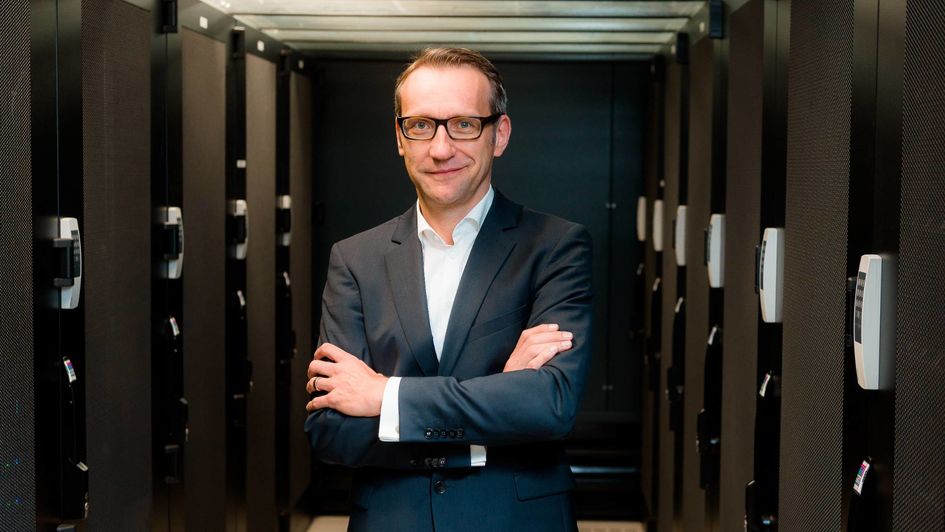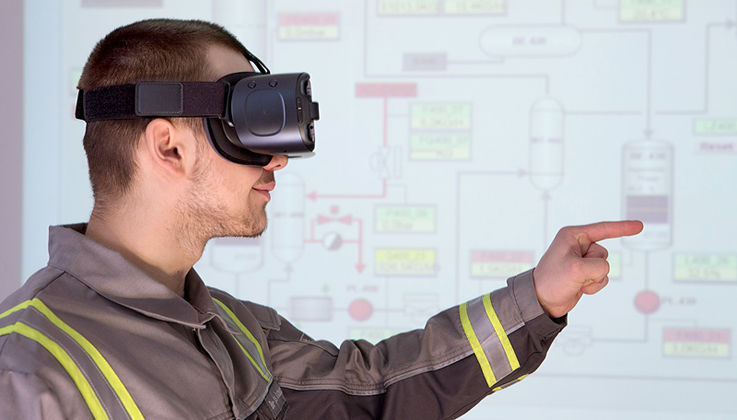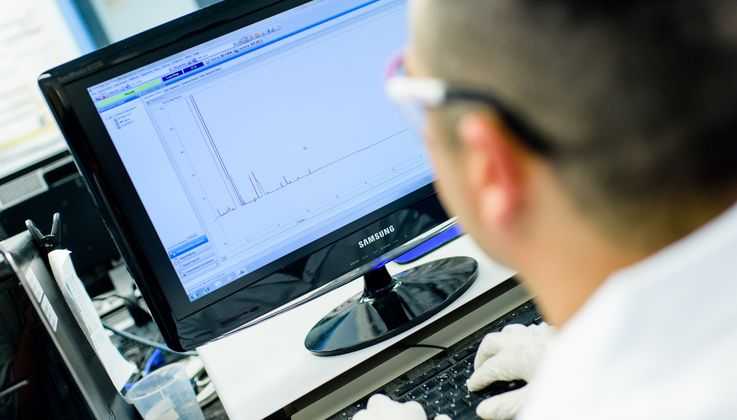Digitalization keeps on going
Products from the chemical industry make digitalization possible in applications ranging from cell phone displays to memory chips and circuit boards. It’s also transforming the sector’s selfimage. Henrik Hahn, Evonik’s chief digital officer, is responsible for digitalization throughout the company. His focus is on the customers - and on the employees of his own company.
Dr. Hahn, for many people the word “digitalization” is associated with smartphones, computers, and the Internet. But what about the chemical sector? How is it connected with digitalization?
Without the chemical industry, digitalization would not be a reality. Our sector makes it possible for all of us to use modern technology, devices, and data networks in our daily lives. Circuit boards, cell phone displays, and memory chips are examples of everyday technologies that stem from the wealth of skills and solutions in the chemical industry.
That makes sense, but in the case of many products this was also the case even before digitalization. What has changed as a result of digitalization?
The basic aim is still to make the processes in our daily lives simpler, faster, more effective, or even automatic. Digitalization is a new tool for achieving this aim - a tool that is extremely powerful and can be applied in a wide variety of ways. For example, we can use sensors and digital data to figure out ahead of time when a pump in a production plant will give up the ghost. An employee who knows that can order the necessary replacement part well ahead of time and install it before the pump is damaged and production comes to a standstill. Another example is the navigation system in a car: It not only guides us from A to B but also helps manage the flow of traffic, shows current areas of congestion, and suggests advisable alternate routes.

Henrik Hahn, who has a degree in process engineering, has worked at Evonik since 1999 and has been responsible for the company’s digitalization strategy since 2016. Aer joining the company as a process engineer, he completed assignments in the USA and Belgium and worked in a variety of management positions in the areas of technology and innovation. His responsibilities included the establishment and management of a corporate startup for the development and production of components for lithium-ion batteries. He was already interested in the topic of digitalization in the form of data analysis and modeling while he was working on his doctoral dissertation in the area of rheology and fluid mechanics. In addition, during his study of business management he addressed supply-chain management issues in the field of information economics, as well as mathematical game theory applied to the cooperation behavior of companies.
As Evonik’s chief digital officer, or CDO, you may be thrilled by all these developments, but shouldn’t the rest of the world simply check them off - finished, end of story?
The coronavirus has shown us that even leading industrialized countries are still far from having finished their homework. However, it’s also true that digitalization is an ongoing task. There’s a constant flow of new ideas, possible applications, and innovations. As a result, the economic and social aspects of daily life are changing all over the world. This isn’t happening through one short and severe upheaval - on the contrary, digitalization is a permanent process. And it also offers Evonik many new opportunities within the company. Together with my team, I’m making sure that we identify, test, and make good use of these opportunities throughout Evonik without claiming that we have any exclusive rights over them. That’s because digitalization ultimately affects everyone. It also means that every employee can have good ideas about it.
What does that mean in concrete terms within the sector?
The traditional purpose of the chemical industry is to deliver products to its customers - safely, reliably, and at a constant high level of quality. This will not change. However, Evonik wants to do it even better. And that’s why we are investigating many areas early on to find out what is working, what is useful, and what is helping us stay successful as a company. Evonik regards close cooperation with customers as a key to success - and digitalization offers entirely new opportunities in this area.
Is the industry evolving into a services provider?
No, the manufacture of chemical products is still our central task. But above and beyond that, digitalization improves our opportunities to offer customers expert and tailored services together with the products themselves. We want to provide comprehensive support for our customers’ success. And there are now additional innovative ways to interact with them. These possibilities include not only products and services but also direct communication with customers as partners, as well as jointly developed innovations.
Does this mean that in the future communication in the business world won’t only be between computers - in spite of digitalization?
Digitalization is still a tool that is used by people. And people are still at the center of things, even in areas where machine-to-machine communication is being used. Our human resources experts are also very committed to this principle. Evonik considers it important to fine-tune and strengthen a digital and agile corporate culture. Digitalization is also a learning journey, and we want to take as many people as possible along with us. The key to that is an intelligent connection between the new technical opportunities and our familiar and customary processes. Digitalization doesn’t mean that we’re reinventing the wheel. We’re only improving the ride.
Where is Evonik beginning these in-house improvements? What are the focus areas?
Digitalization is a cross-unit issue, and it actually affects every area of the company. That’s why it’s important to bring together the strong skills of all the professional and functional units in a targeted way. As the CDO, I also define myself as a coordinator, advisor, and bridgebuilder. Many projects are already running at various levels of Evonik. They range from optimizations of production processes to new training and continuing education courses, predictive maintenance of facilities, and digital assistance systems in research and application technology. Another focus is on blockchain: By means of digitalization, we want to use it to quickly and securely manage deliveries and payments between companies, for example. This is an interesting prospect for Evonik, and that’s why we are running a pilot project in this area.
Are digital trading platforms playing a special role?
E-commerce and platforms that offer comprehensive services are becoming increasingly important for the chemical industry as well as for other sectors. It’s all about the digital customer experience: Many people have already found out at the private level that there are great differences between shopping opportunities on the Internet. For business operations between companies, factors such as clear organization, good service, reliability, and individualized products and services are also what counts. Evonik knows that, and it has launched an in-house program to implement these ideas. That’s how we are taking advantage of the opportunities opening up in this area. In China, for example, Evonik has created its own flagship store for business customers on Alibaba’s online trading market 1688.com. That gives customers additional digital access to our products. In addition, Evonik recently invested in chembid, the world’s biggest search engine and market intelligence platform for chemicals. That way we are promoting the development of an independent digital sales platform for the chemical industry.
At the moment there’s a lot of discussion of artificial intelligence, or AI for short. Is this an interesting topic for Evonik?
Of course. To give you one example, we are cooperating with Massachusetts Institute of Technology (MIT) in the USA on the practice-oriented research and development of artificial intelligence. Evonik is the world’s first company from the chemical industry to participate in the MIT-IBM Watson AI Lab. At the MIT campus in Cambridge, international experts from universities and industry are investigating potential industrial applications of artificial intelligence and their effects.
What should artificial intelligence be thinking about at a specialty chemicals company?
AI deals with systems that are capable of learning. To give you a simple example, if you regularly open the kitchen door at 8 a.m., turn on the radio, then open the window, and finally make yourself a cup of coffee, at some point a machine that uses AI will understand that. The machine has learned this structure - and in the future it will automatically have your cup of coffee ready for you at exactly the right time. Of course people can always intervene and make changes. At Evonik, for example, we’re investigating how artificial intelligence can support us in our research and development activities. Digital systems that are capable of learning offer us new ways to simulate and assess research projects. Since 2017, we have been in a strategic partnership with IBM, which we recently extended. By working together we have already successfully used algorithms to analyze a huge and convoluted database quickly and precisely. Digital support from AI spared our experts from a long and laborious search. AI is also helping us develop new products faster in the area of high performance polymers.
You are also the CEO of Evonik Digital GmbH. Is that your team for especially tough cases?
That sounds good, but the situation is a little bit different. Evonik’s aim throughout the Group is to introduce and utilize convincing solutions based on digitalization. But first, these solutions have to be sought and found. That’s the purpose of Evonik Digital GmbH, which consists of a team of experts that is quick, flexible, and equipped with lots of leeway. Evonik Digital is much more strongly focused on identifying and testing new trends, concepts, and opportunities in the world of digitalization. So it’s a combination of an idea factory, a testing ground, a base for cooperation and, last but not least, a learning center. We’re looking to see what works and what doesn’t. In both cases, the company benefits from our findings.



